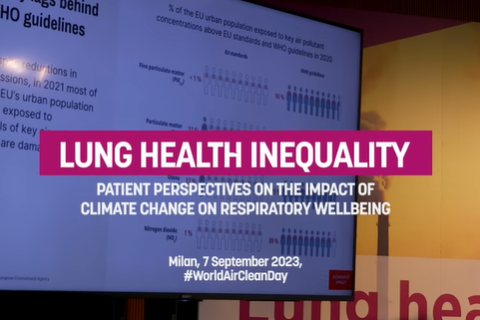Let’s clear
the air
Tap the particles to explore
The climate crisis is a health crisis
Climate & Health
Climate change is exacerbating
respiratory diseases
Lower air quality is one of the unfortunate consequences of climate change; impacted over decades by increasing carbon emissions, rising temperatures and more frequent extreme weather events1. Outdoor air pollution, exacerbated by climate change, causes 4.2 million premature deaths annually2. At Chiesi, we’re committed to taking decisive action to protect patients and planet health. The time to act is now and our teams are already implementing steps to make a meaningful difference.
Bringing patient and expert perspectives into focus
of people in poor air quality areas report worsened lung conditions outdoors3
of people in areas with poor air quality report that heatwaves/extreme weather exacerbates symptoms4
- Watch this video to explore how the transition towards carbon-minimal inhalers can contribute to tackling climate change while protecting patient health.
- Watch this video to explore how the transition towards carbon-minimal inhalers can contribute to tackling climate change while protecting patient health.

The increasing number of heatwaves and increased pollen load - both generally associated with climate change - are already having a notable negative impact on people living with lung conditions5

Climate & Chiesi
Sustainability means accountability.
Patient centricity is at the core of our commitment
That’s why our teams are dedicated to creating innovative solutions that ensure patients have the tools they need to deal with their conditions. Informed by our understanding of the experiences of patients, as well as the critical need to improve the carbon footprint of our treatment, our team developed the carbon-minimal inhaler platform which will deliver inhalers with equal safety, efficacy, and usability, but minimize the carbon emissions generated. This will enable a seamless transition for patients and benefits for the planet6.
Chiesi is committed to partnering with its supply chain to reduce carbon emissions from the healthcare sector
We aim to reduce GHG emissions in our value chain by encouraging our partners and suppliers to lower their carbon footprints, aiding Chiesi’s climate goals. We share sustainability information and support on emission reduction strategies. As a Benefit Corporation, we promote interdependence, collaborating with partners to align with regulatory frameworks in our operating countries and enhancing support for those affected by diseases, ensuring progress through collaboration and co-creation.
Words in action
Reaching net zero by 2035
Inhaler emission reduction
[1] https://www.eea.europa.eu/publications/air-pollution-and-childrens-health/air-pollution-and-childrens-health/#fn1
[2] World Health Organization, “Pollutants not only severely impact health, but also the earth’s climate and ecosystems globally”,
[3] Economist Impact, “Cleaner air, clearer lungs, better lives. Exploring the intersection of air quality, health inequalities and lung health”, 2023
[4] Economist Impact, “Cleaner air, clearer lungs, better lives. Exploring the intersection of air quality, health inequalities and lung health”, 2023
[5] Economist Impact, “Cleaner air, clearer lungs, better lives. Exploring the intersection of air quality, health inequalities and lung health”, 2023
Healthcare for a healthy planet
- Explore the boxes below to see some of the ways Chiesi is working to protect patients, planet, prosperity, and people, and increase understanding of climate change to inform action.
Definition:
Climate Change
Sustainable Development Goals
Carbon minimal inhaler project
Code of Interdependence
Chiesi commitment: Renewable energy
Industry commitment
[6] Clinical Trials.Gov. Comparison Between CHF5993 pMDI 200/6/12,5mg HFA-152a VS CHF5993 pMDI 200/6/12,5mg HFA-134a in Subjects With Asthma (Trecos) (TRECOS). Available at https://clinicaltrials.gov/study/NCT06264674?term=HFC%20152a%20&cond=asthma&rank=14. Last accessed July 2024.
[7] www.chiesi.uk.com/img/news/aILSv9oO6J_chiesi-cn-project—consumer-and-trade-press-release.pdf
[8] 2022 Annual and sustainability report, https://www.chiesi.com/en/about-us/annual-report-and-csr/
News
In the links below you can find the latest news from Chiesi including updates on our climate, sustainability, and respiratory health activities, in addition to our latest relevant reports and publications.
References
[9] https://www.un.org/en/climatechange/what-is-climate-change
[10] Masson-Delmotte V, Zhai P, Pirani A, et al., eds. Climate change 2021: the physical science basis. Contribution of working group I to the sixth assessment report of the Intergovernmental Panel on Climate Change. Cambridge, Cambridge University Press, 2021. doi: 10.1017/9781009157896
[11] https://www.ncbi.nlm.nih.gov/pmc/articles/PMC10365076/
[12] https://www.chiesi.com/en/sustainability/chiesis-sustainability/
[13] https://www.chiesi.com/documenti/30_code-of-interdependence.pdf
[14] 2022 Annual and sustainability report, https://www.chiesi.com/en/about-us/annual-report-and-csr/
[15] https://www.weforum.org/agenda/2022/10/cop27-how-healthcare-can-reduce-carbon-footprint/





